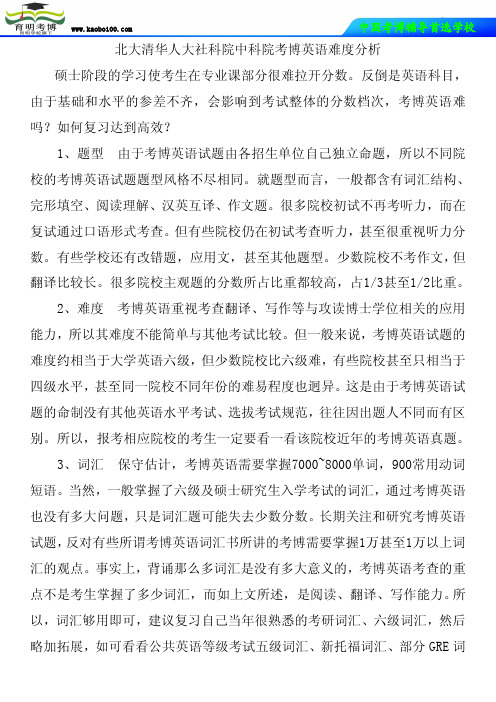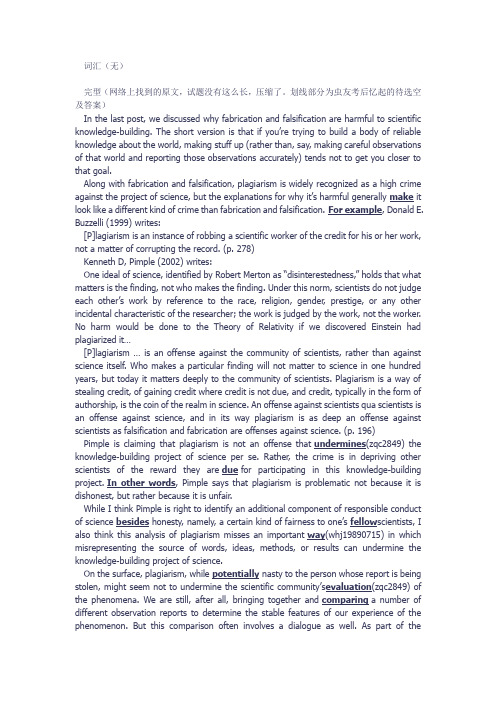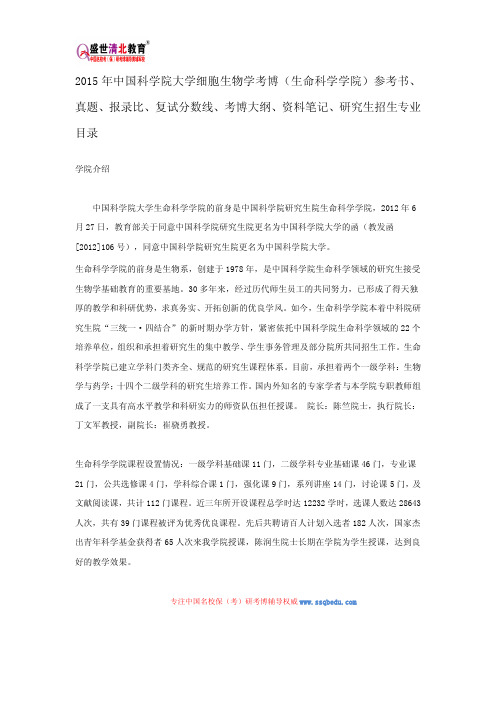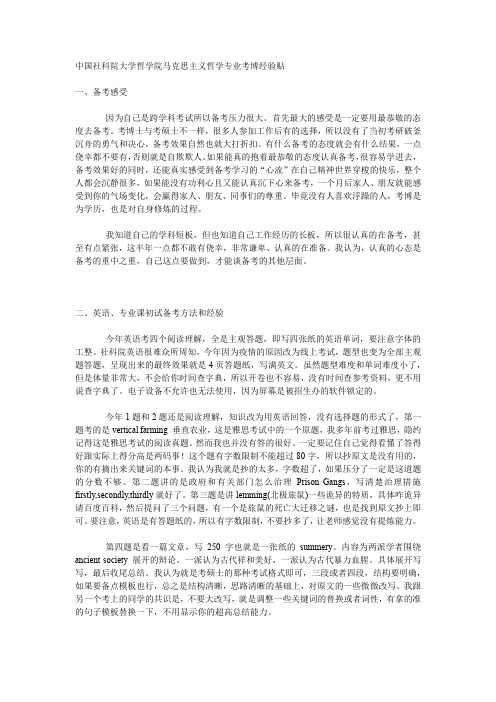2015中国科学院大学人文学院科学哲学考博分析
北大清华人大社科院中科院考博英语难度分析

北大清华人大社科院中科院考博英语难度分析硕士阶段的学习使考生在专业课部分很难拉开分数。
反倒是英语科目,由于基础和水平的参差不齐,会影响到考试整体的分数档次,考博英语难吗?如何复习达到高效?1、题型由于考博英语试题由各招生单位自己独立命题,所以不同院校的考博英语试题题型风格不尽相同。
就题型而言,一般都含有词汇结构、完形填空、阅读理解、汉英互译、作文题。
很多院校初试不再考听力,而在复试通过口语形式考查。
但有些院校仍在初试考查听力,甚至很重视听力分数。
有些学校还有改错题,应用文,甚至其他题型。
少数院校不考作文,但翻译比较长。
很多院校主观题的分数所占比重都较高,占1/3甚至1/2比重。
2、难度考博英语重视考查翻译、写作等与攻读博士学位相关的应用能力,所以其难度不能简单与其他考试比较。
但一般来说,考博英语试题的难度约相当于大学英语六级,但少数院校比六级难,有些院校甚至只相当于四级水平,甚至同一院校不同年份的难易程度也迥异。
这是由于考博英语试题的命制没有其他英语水平考试、选拔考试规范,往往因出题人不同而有区别。
所以,报考相应院校的考生一定要看一看该院校近年的考博英语真题。
3、词汇保守估计,考博英语需要掌握7000~8000单词,900常用动词短语。
当然,一般掌握了六级及硕士研究生入学考试的词汇,通过考博英语也没有多大问题,只是词汇题可能失去少数分数。
长期关注和研究考博英语试题,反对有些所谓考博英语词汇书所讲的考博需要掌握1万甚至1万以上词汇的观点。
事实上,背诵那么多词汇是没有多大意义的,考博英语考查的重点不是考生掌握了多少词汇,而如上文所述,是阅读、翻译、写作能力。
所以,词汇够用即可,建议复习自己当年很熟悉的考研词汇、六级词汇,然后略加拓展,如可看看公共英语等级考试五级词汇、新托福词汇、部分GRE词汇。
有些院校公布了词汇表或参考词汇表,但实际出题人并不怎么按大纲出题。
英语说到底还是个水平问题。
4、语法大部分院校考博英语试题都不直接考查语法,但语法有必要全面复习一下。
15中科院考博英语部真题

词汇(无)完型(网络上找到的原文,试题没有这么长,压缩了。
划线部分为虫友考后忆起的待选空及答案)In the last post, we discussed why fabrication and falsification are harmful to scientific knowledge-building. The short version is that if you’re trying to build a body of reliable knowledge about the world, making stuff up (rather than, say, making careful observations of that world and reporting those observations accurately) tends not to get you closer to that goal.Along with fabrication and falsification, plagiarism is widely recognized as a high crime against the project of science, but the explanations for why it’s harmful generally make it look like a different kind of crime than fabrication and falsification. For example, Donald E. Buzzelli (1999) writes:[P]lagiarism is an instance of robbing a scientific worker of the credit for his or her work, not a matter of corrupting the record. (p. 278)Kenneth D, Pimple (2002) writes:One ideal of science, identified by Robert Merton as ―disinterestedness,‖ holds that what matters is the finding, not who makes the finding. Under this norm, scientists do not judge each other’s work by reference to the race, religion, gender, prestige, or any other incidental characteristic of the researcher; the work is judged by the work, not the worker. No harm would be done to the Theory of Relativity if we discovered Einstein had plagiarized it…[P]lagiarism … is an offense against the community of scientists, rather than against science itself. Who makes a particular finding will not matter to science in one hundred years, but today it matters deeply to the community of scientists. Plagiarism is a way of stealing credit, of gaining credit where credit is not due, and credit, typically in the form of authorship, is the coin of the realm in science. An offense against scientists qua scientists is an offense against science, and in its way plagiarism is as deep an offense against scientists as falsification and fabrication are offenses against science. (p. 196)Pimple is claiming that plagiarism is not an offense that undermines(zqc2849) the knowledge-building project of science per se. Rather, the crime is in depriving other scientists of the reward they are due for participating in this knowledge-building project. In other words, Pimple says that plagiarism is problematic not because it is dishonest, but rather because it is unfair.While I think Pimple is right to identify an additional component of responsible conduct of science besides honesty, namely, a certain kind of fairness to one’s fellow scientists, I also think this analysis of plagiarism misses an important way(whj19890715) in which misrepresenting the source of words, ideas, methods, or results can undermine the knowledge-building project of science.On the surface, plagiarism, while potentially nasty to the person whose report is being stolen, might seem not to undermine the scientific community’s evaluation(zqc2849) of the phenomena. We are still, after all, bringing together and comparing a number of different observation reports to determine the stable features of our experience of the phenomenon. But this comparison often involves a dialogue as well. As part of theknowledge-building project, from the earliest planning of their experiments to well after results are published, scientists are engaged in asking and answering questions about the details of the experience and of the conditions under which the phenomenon was observed.Misrepresenting someone else’s honest observation report as one’s own strips the report of accurate information for such a dialogue. It’s hard to answer questions about the little, seemingly insignificant experimental details of an experiment you didn’t actually do, or to refine a description of an experience someone else had. Moreover, such a misrepresentation further undermines the process of building more objective knowledge by failing to contribute the actual insight of the scientist whoappears to be contributing his own view but is actually contributing someone else’s. And while it may appear that a significant number of scientists are marshaling their resources to understand a particular phenomenon, if some of those scientists are plagiarists, there are fewer scientists actually grappling with the problem than it would appear.In such circumstances, we know less than we think we do.Given the intersubjective route to objective knowledge, failing to really weigh in to the dialogue may end up leaving certain of the subjective biases of others in place in the collective ―knowledge‖ that results.Objective knowledge is produced when the scientific community’s members work with each other to screen out subjective biases. This means the sort of honesty required for good science goes beyond the accurate reporting of what has been observed and under what conditions. Because each individual re port is shaped by the individual’s perspective, objective scientific knowledge also depends on honesty about the individual agency actually involved in making the observations. Thus, plagiarism, which often strikes scientists as less of a threat to scienti fic knowledge (and more of an instance of ―being a jerk‖), may pose just as much of a threat to the project of producing objective scientific knowledge as outright fabrication.What I’m arguing here is that plagiarism is a species of dishonesty that can un dermine the knowledge-building project of science in a direct way. Even if what has been lifted by the plagiarist is ―accurate‖ from the point of view of the person who actually collected or analyzed the data or drew conclusions from it, separating this contribution from its true author means it doesn’t function the same way in the ongoing scientific dialogue.In the next post, we’ll continue our discussion of the duties of scientists by looking at what the positive duties of scientists might be, and by examining the sources of these duties.阅读:Passage One(无)Passage Two – Passage Five同2009.3 (Passage One – Passage Four)六选五:第一篇(无)第二篇(同2014.3六选五Passage One)翻译:Our best college students are very good at being critical. In fact being smart, for many, means being critical. (1) Having strong critical skills shows that you will not be easily fooled. It is a sign of sophistication, especially when coupled with an acknowledgment of one’s own “privilege.”The combination of resistance to influence and deflection of responsibility by confessing to one’s advantages is a sure sign of one’s ability to negotiate the politics of learning on campus. But this ability will not take you very far beyond the university. Taking things apart, or taking people down, can provide the satisfactions of cynicism. But this is thin gruel. The skill at unmasking error, or simple intellectual one-upmanship, is not totally without value, but we should be wary of creating a class of self-satisfied debunkers — or, to use a currently fas hionable word on campus, people who like to ―trouble‖ ideas.(2) In overdeveloping the capacity to show how texts, institutions or people fail to accomplish what they set out to do, we may be depriving students of the chance to learn as much as possible from what they study.In campus cultures where being smart means being a critical unmasker, students may become too good at showing how things can’t possibly make sense.(3) They may close themselves off from their potential to find or create meaning and direction from the books, music and experiments they encounter in the classroom.(4) Once outside the university, these students may try to score points by displaying the critical prowess for which they were rewarded in school, but those points often come at their own expense. As debunkers, they contribute to a cultural climate that has little tolerance for finding or making meaning — a culture whose intellectuals and cultural commentators get ―liked‖ by showing that somebody else just can’t be believed. But this cynicism is no achievement.Liberal education in America has long been characterized by the intertwining of two traditions: of critical inquiry in pursuit of truth and exuberant performance in pursuit of excellence. (5)In the last half-century, though, emphasis on inquiry has become dominant, and it has often been reduced to the ability to expose error and undermine belief. The inquirer has taken the guise of the sophisticated (often ironic) spectator, rather than the messy participant in continuing experiments or even the reverent beholder of great cultural achievements.作文:大意:常言道“富不过三代”,你怎么看?。
中科院科学技术哲学考研(自然科学史研究所)参考书、历年真题、报录比、研究生招生专业目录、复试分数线

2015中科院科学技术哲学考研(自然科学史研究所)参考书、历年真题、报录比、研究生招生专业目录、复试分数线一、学院介绍中国科学院自然科学史研究所是中国唯一的多学科和综合性的科技史专门研究机构,是世界上少数几个中国科技史的研究中心之一,李俨、仓孝和、严敦杰、席泽宗、陈美东、廖克、刘钝、廖育群先后担任过所长(或负责人),现任所长为张柏春研究员。
中国科学院自然科学史研究所的前身中国自然科学史研究室,由著名地理学家、中国科学院副院长竺可桢创议成立于1957年,1975年扩建成为研究所。
目前研究所设有中国古代科技史研究室(含中国传统科技文明研究中心)、中国近现代科技史研究室(含中国科学院院史研究室)、西方科技史研究室三个研究室,以及中国科学院传统工艺与文物科技研究中心、科学与文化研究中心、中国古天文联合研究中心、中外科技发展比较研究中心、中国科学院学部学科发展战略研究中心等。
主办《自然科学史研究》、《中国科技史杂志》和《科学文化评论》三个刊物。
另设1个专业图书馆。
2012年底在职职工120人。
研究员中有国际科学史研究院院士3人、国际欧亚科学院院士1人。
自然科学史研究所主要从事科学与技术发展的历史和规律,科技与社会、经济、思想、文化之关系,以及相关的科技发展战略研究,是中国科学院内少数兼具自然科学与人文社会科学功能的研究实体之一。
为国务院学位委员会确认的“科学技术史”一级学科学位授予点,在国内从事科学技术史及相关学科研究的机构中具有公认的核心地位,在国际科学史界有较大的影响。
研究所学科建设与发展方向在未来的五至十年,将逐步实现研究重点从中国传统科学技术史向中外近现代科学技术史的转移;借鉴哲学、社会学、人类学、心理学、考古学等人文社会科学的方法、理论和成果,拓展研究领域和视野,开展基于科学技术史的科学技术与社会、科学与文化、科学技术哲学、科技政策和科技战略研究等交叉科学研究,重视社会史、思想史、文化史取向的科技史研究;并充分关注当代科学和技术发展所引起的社会文化问题,弥合科学文化与人文文化之间的鸿沟,致力于与科技文明相适应的现代文化的建设,为中华文明的复兴做出应有的贡献。
2015中科院生命科学学院考博参考书、真题、报录比、复试分数线、考博大纲、资料笔记、研究生招生专业目录

检验考生是否具有进入攻读博士学位阶段的英语水平和能力。 考试类型、考试内容及考试结构
本考试共有五个部分:词汇(占 10%)、完形填空(占 15%)、阅读理解(占 40%)、 英译汉(占 15%),写作(占 20%)。试卷分为:试卷一(Paper One)客观试题,包括前 三个部分,共 75 题,顺序排号;试卷二(Paper Two)主观试题,包括英译汉和写作两个 部分。
05 生物分析
丁永胜
①1001 英语一②2464 分子生 物学③3477 细胞生物学
06 哺乳动物的遗传与发育 袁莉
同上
07 环境与健康 糖尿病
丁文军
①1001 英语一②2181 分子生 为中丹
物学(A)③3250 细胞生物学 学院代
(A)
招,挂
靠生命
科学学
院招生
071300 生态学
01 草地生态学、生物地球 王艳芬
一、词汇 主要测试考生是否具备一定的词汇量和根据上下文对词和词组意义判断的能力。词和
词组的测试范围基本以本考试大纲词汇表为参照依据。共 20 题。每题为一个留有空白的英 文句子。要求考生从所给的四个选项中选出可用在句中的最恰当词或词组。
二、完形填空 主要测试考生在语篇层次上的理解能力以及对词汇表达方式和结构掌握的程度。考生
①1001 英语一②2543 生态学
专注中国名校保(考)研考博辅导权威
化学 02 土壤生态学、生理生态
崔骁勇 学
③3558 微生物学
①1001 英语一②2543 生态学 ③3531 土壤学
六、中国科学院大学英语考博大纲
考试对象 报考中国科学院大学各单位(具体指中国科学院所属各研究院、所、中心、园、台、
科哲科史博士点

科技史博士点
1. 北京大学
2. 北京科技大学
3. 内蒙古师范大学
4. 南京农业大学
5. 山西大学
6. 西北大学
7. 中国科学技术大学
8. 中国科学院研究生院/中科院自然科学史所
科技哲学专业博士点(26个)
1,中国社会科学院哲学研究所,1984年(第2批)批准(首任导师:龚育之教授)
2,吉林大学,1984年(第2批)批准(首任导师:舒炜光教授)
3,中国人民大学,1986年(第3批)批准(首任导师:黄顺基教授)
4,北京大学,1990年批准(首任导师:孙小礼教授)
5,东北大学,1994年批准(首任导师:陈昌曙教授)
6,上海社会科学院哲学所/复旦大学哲学系,1998年批准
7,山西大学,1998年批准
8,清华大学,2000年批准
9,华南师范大学,2000年批准
10,南京大学,2000年批准
11,厦门大学,2000年批准
12,浙江大学,2002年
13,中科院研究生院,2002年
14,中国科技大学,2002年
15,中央党校,2002年
16,北京师范大学,2002年
17,武汉大学,2002年
18,中山大学,2002年
19,南开大学,2002年
20,黑龙江大学,2006年
21,山东大学,2006年
22,湖南师大,2006年
23,大连理工,2006年
24,东南大学,2006年
25,华中科技大学,2006年
26,国防科技大学,2006年。
中国社科院大学哲学院马克思主义哲学专业考博经验贴

中国社科院大学哲学院马克思主义哲学专业考博经验贴一、备考感受因为自己是跨学科考试所以备考压力很大。
首先最大的感受是一定要用最恭敬的态度去备考。
考博士与考硕士不一样,很多人参加工作后有的选择,所以没有了当初考研破釜沉舟的勇气和决心,备考效果自然也就大打折扣。
有什么备考的态度就会有什么结果,一点侥幸都不要有,否则就是自欺欺人。
如果能真的抱着最恭敬的态度认真备考,很容易学进去,备考效果好的同时,还能真实感受到备考学习的“心流”在自己精神世界穿梭的快乐,整个人都会沉静很多,如果能没有功利心且又能认真沉下心来备考,一个月后家人、朋友就能感受到你的气场变化,会赢得家人、朋友、同事们的尊重。
毕竟没有人喜欢浮躁的人,考博是为学历,也是对自身修炼的过程。
我知道自己的学科短板,但也知道自己工作经历的长板,所以很认真的在备考,甚至有点紧张,这半年一点都不敢有侥幸,非常谦卑、认真的在准备。
我认为,认真的心态是备考的重中之重,自己这点要做到,才能谈备考的其他层面。
二、英语、专业课初试备考方法和经验今年英语考四个阅读理解,全是主观答题,即写四张纸的英语单词,要注意字体的工整。
社科院英语很难众所周知,今年因为疫情的原因改为线上考试,题型也变为全部主观题答题,呈现出来的最终效果就是4页答题纸,写满英文。
虽然题型难度和单词难度小了,但是体量非常大,不会给你时间查字典,所以开卷也不容易,没有时间查参考资料,更不用说查字典了。
电子设备不允许也无法使用,因为屏幕是被招生办的软件锁定的。
今年1题和2题还是阅读理解,知识改为用英语回答,没有选择题的形式了,第一题考的是vertical farming 垂直农业,这是雅思考试中的一个原题,我多年前考过雅思,隐约记得这是雅思考试的阅读真题。
然而我也并没有答的很好。
一定要记住自己觉得看懂了答得好跟实际上得分高是两码事!这个题有字数限制不能超过80字,所以抄原文是没有用的,你的有摘出来关键词的本事。
我的考博经验-考中科院博士经验

总体说来中科院的博士比其他院校的博士要容易一些,原因有以下几个方面:第一:中科院的招生指标较多,不像有些高校,招生名额有限,而且本校的学生已经占去大半的名额(因为好多本校的考生和导师都认识,有的还很熟悉,这在末各方面来讲就是很大的优势)。
第二:中科院的考试题相对来说较简单,里面的深奥的数学计算和推导占的比重很小,他的考试内容更注重基础知识的应用。
如:一些常见的分子式,一些常用的物质的性质等。
而高校的考题在这方面来说就比中科院的考题难了。
尤其对于数学功底不深的同学来说就更难了。
第三:招生相对公平,中科院的老板们招收博士生的目的是为了干活儿,出东西,他们也追求最大的剩余价值啊呵呵(这里不妨这样说),所以大多数的考生根本不认识老板,这样在考试和面试的时候大家都是站在一个起跑线上的,只要你表现的好,老板就可能要你呀!当然这里面不乏有先在实验室里干活的考生,他们基本上是内定的折就令当别论了。
从以上三点可以看出考中科院的博士较其他高校容易一些。
但这并不等于说他就多么好考。
这是相对而言的。
至于考试的准备:如:1、考试之前必须得调查一番了。
首先是和你相关专业的老板,而且在这一领域也算得上佼佼者了。
其次看谁的经费充足,因为这是很现实的问题,在科院,没有钱是万万行不通的,这也关系到将来的毕业问题呀。
再有就是看看人家有没有哪种联合培养的博士什么的,如果有那就机会小得多了。
2、准备。
准备的过程就相当的重要了,在此期间要有肯广阔的视野,包括相关领域的一些进展要了解,再有就是看一些往年的试题。
(这里介绍一个窍门,就是a 看一些科院往年的硕士考试的试题,那里面可能会有重复出现的试题。
b 就是中国科技大学的试卷也有借鉴意义的呀!!)3、考试。
这是最重要的一关了,考试要把心态放平,其实科院的英语还是有一定难度的,千万不要轻视,要多多积累,专业课其实大家都差不了多少。
但专业课是提高分数的有效手段,故也不能轻视,专业课以问答题居多,而且每题的分值较大。
中科院考博经验,超详细的,欢迎围观!!!

中科院考博经验,超详细的,欢迎围观展开全文写在前面本文适合基础不行笨鸟先飞型的学生总的说来我考博成功就是两个词:信心毅力。
很多牛人考了高分也不出来分享经验,我认为不是因为他们不想,是不会。
因为高分根本就是水到渠成,没什么感觉就成功了。
写经验贴的大部分是我这种摸爬滚打才勉强及格的,但是你按照下列方法认真复习,绝对高分!凡事预则立不预则废。
无论你平时有多懒基础有多差都不是借口,决定投入的时候就要做好详细的计划并执行,这样咸鱼也能翻身,不然就真的重在参与了。
当然朝着目标前进的决心是必不可少的,可以排除万难!零我是应届的,本来想保险点打算报“少干”计划的,但是网上有说万一名额满了只能计划里调,不能调普通的,容易被刷,于是还是正常报名了。
而且只报了一个学校(硕导介绍过去的)。
只知道那个老师有一个名额,多少人竞争不了解。
考不上考不上吧,一切都是命。
说是随缘,但是还得认真看,必须认真,至少保证不会后悔。
中科院的博士不是只要考就能考上的(至少不是我这种人),还要认真复习。
需要认真看,却不需要花太多钱。
之前因为我自己的一些私事无法专心,到(2013年)2月底开学回学校了才开始正式的脱产复习(当时硕士已经毕业,2.5年学制),在家时只背了单词、看了专业课的课本,开学前都是打酱油。
一、英语和硕士入学考试题型相近,方法也差不多,主要就是阅读和写作两大块。
单词是基础。
本人的英语水平比较差,什么程度呢,不怕大家笑话,就是考研的时候四级刚过,六级至今未过。
这个基础没有吃老本的可能了,只能从头努力。
1、单词开始用的是中科院出的那本绿的单词(师兄留下的),实在太旧了,不爱~~~懒得看,网上下了几个电子版的也看着累,很快失去新鲜感。
是不是就这样荒废了呀?木有,楼主有救星。
就是鼎鼎大名的“扇贝网”。
一个在线背单词网站,自带单词书,可以按照你的要求安排每天单词学习量并复习,完了打卡。
有android版和iphone版的客户端,方便在手机上用。
- 1、下载文档前请自行甄别文档内容的完整性,平台不提供额外的编辑、内容补充、找答案等附加服务。
- 2、"仅部分预览"的文档,不可在线预览部分如存在完整性等问题,可反馈申请退款(可完整预览的文档不适用该条件!)。
- 3、如文档侵犯您的权益,请联系客服反馈,我们会尽快为您处理(人工客服工作时间:9:00-18:30)。
2015中国科学院大学人文学院科学哲学考博分析一、招考介绍
2014
01科学哲学孟建伟①1001英语一②2024科学技术与社会③3376科学哲学
二、联系导师
在初步定好考博学校之后,就要和所报考院校中意的老师取得联系,询问是否有招生名额,能否报考,这是我们考博成功的关键第一步。
大多数考生会在九月中下旬与导师取得联系。
因为太早,学校里面直博名额什么的还没有确定,报考的导师也不清楚是否有名额;太晚的话,怕别的学生比你早联系就不好了。
一般情况下,导师对一个学生很中意的话,后来联系的学生,导师一般也不会答应其报考了。
在此说点题外话,联系导师的过程中,如果读研期间的导师有关系,可以尽量利用。
如果没有,也没关系,凭着自己的本事也是可以和考博导师很好的沟通的,这就要看自己了。
通常跟导师初次联系,都是发邮件。
导师回复邮件的情况一般有几种:
(1)、欢迎报考。
这种答复最笼统,说明不了问题。
我们可以接着努力和老师多沟通,看看具体的进展,避免出现初试之后却没有名额的情况。
(2)、名额有限,可以报考,但有竞争。
很多人说这样的回复不满意,认为希望很小一般会被刷。
其实这样还是比较好的一种回答,最起码导师没有骗你而且给你机会去证明自己,考的好就可以上。
(3)、你的研究方向和我一样......各种一大堆他的研究方向和你相关,欢迎报考什么的话。
不可否认,这是最好的情况,你可以放心的去考,一般不会出问题的。
但不排除偶然,像出现直博和本学校的硕转博名额问题,可能会给我们的报考和录取产生影响。
总之考博凭的是实力和自身的本事,关系只是占一部分,自己努力了就行,不用过分纠结于导师回复有没有啥隐含意思的。
初次联系好导师后,一定要注意跟导师保持联系。
每半个月或者一个月向导师汇报一下学习情况或者复习情况,交流一下科研方向,这很有必要。
一方面让导师觉得你很想去跟他深造,另一方面显得你虔诚好学。
三.参考书目与复试分数线
中国科学院大学的这个专业近年来不指定参考书目,所以大家在复习和备考过程中应该密切关注出题老师最新的学术研究动态同时要对往年的专业课真题进行分析和研究,另外还要注意搜集出题老师上课所使用的课件、讲义和笔记等资料。
四.考博英语题型简介
PART1VOCABULARY10分20题
PART2CLOZE15分15题
PART3READING40分
PART4TRANSLATION英译汉15
PART5WRITING20分
1英语复习推荐用书:
育明考博教研部主编的《考博英语真题解析》和《考博词汇》是考博人必备的两本书。
在当当网,亚马逊和全国各大书店均有销售,也可以联系我们直接购买
五.育明考博专业课辅导班以及英语辅导班简介(扣扣四九三三七一六二六。
电话:四零零六六八六九七八。
扣扣群:一零五六一九八二零)
本文由“育明考博”整理编辑。
